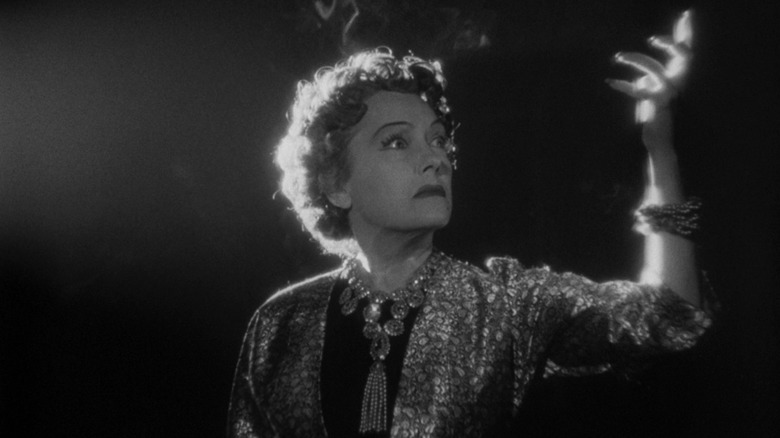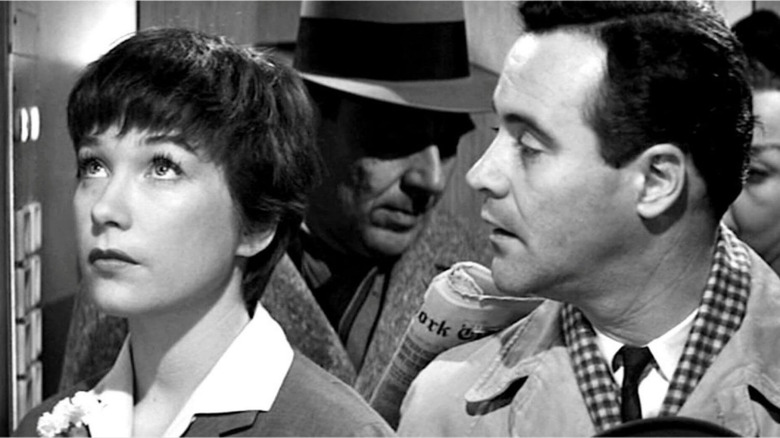Two Of Billy Wilder's Best Films Were Put On Ice For Decades
Billy Wilder directed many of the most time-honored classics of Hollywood's golden age, but Hollywood did not always believe in him. In fact, two of his most famous movies were initially passed over by producers. Thankfully, the multi-Academy Award-winning director eventually helped the big execs see the error of their ways. Without his decades of persistence, two of the most unforgettable films in Hollywood history may have burned in development hell forever.
"Sunset Boulevard" is a staple of studio-era Hollywood, so it's hard to believe that the studios almost stopped it from being made. The 1950 melodrama tells the tale of an aging silent film star, Norma Desmond, failing to adjust to the changing world of talkies. In hopes of clinging to her stardom, she teams up with a hapless screenwriter to give her one last starring role.
The film was released two years after the famous Supreme Court ruling that dissolved Hollywood's factory-like studio system. Paramount Pictures had lost a battle with the government over antitrust laws that would prevent their monopolization of the film industry. This ruling marked the decline of Hollywood's golden age. The studio itself felt like an aging silent film star, struggling to adapt to a changing landscape. Perhaps this is why they finally embraced the idea in the end.
Paramount "wouldn't take on the idea of 'Sunset Boulevard'" when Wilder first pitched it to them in the late 1930s, the director told BFI: "They just didn't understand those themes, they weren't ready for them at the time." Even though Paramount was probably full of Norma Desmond types when Wilder first pitched the film, the studio itself had to fall from grace before they could relate to her plight. This wouldn't come until the 1948 Supreme Court case.
The Apartment was too scandalous for the studios
Wilder also pitched the concept for "The Apartment" to Paramount around this time, but it was not greenlit until 1960. The comedic premise was explicit for its era — corporate cog played by Wilder's longtime collaborator Jack Lemmon works his way up the ladder by loaning his apartment out to his adulterous superiors for their extramarital exploits. The plan leaves him stranded in the streets and alienated by his neighbors most nights, but the promotions he gets in return feel worth it until it backfires in a big way.
The director started producing his own films in 1951. This allowed him more creative control within the restrictive studio system at Paramount. By the time he made "The Apartment" in 1960, he had figured out how to avoid letting the film be manipulated by the studio. Wilder learned this lesson with "Ace in the Hole," he explained to French critic Michael Clement (via FilMagicians). "I ultimately achieved cutting rights from the studio, which is about the best that you can hope for."
Since "The Apartment" alludes to sexual activity and adultery, it flirted with a violation of the strict morality code that dominated Hollywood at the time — the Hays code. The Hays code wasn't officially abolished until 1968, but films like "The Apartment" chipped away at it in the early '60s. The code suppressed any allusion to sexual activity whatsoever, even dictating that married onscreen couples sleep in separate twin beds. "The Apartment" was one of the most explicit films to be made under the code, chalked full of direct and morally ambiguous references to extramarital affairs.
Without Wilder pushing the envelope, Hollywood's antiquated systems may have never evolved. "The Apartment" and "Sunset Boulevard" paved the way for New Hollywood movies like "The Graduate," bending the rules until they were broken.

